Smoke detectors may beep after battery change due to improper installation, dust, malfunction, or expiration. Ensure correct battery type, secure connections, regular cleaning, and replacement every 10 years to maintain optimal function and home safety.
Hi there! I’m your friendly battery expert, and I’ve seen it all when it comes to power-related conundrums. Today, let’s talk about a question I get asked quite often: Why Does a Smoke Detector Still Beep After Changing the Battery?
You know, it’s one of those mysteries that can make even the most experienced battery gurus like I scratch their heads. But don’t worry, I’ve got the answers for you! With my years of experience, I’ve learned that there are several reasons why this happens, and I’m here to guide you through each one. So, buckle up and get ready for a fun and informative ride as we dive into the world of beeping smoke detectors!
Before we dive into the nitty-gritty of why smoke detectors keep beeping, let’s first understand the different types of beeping we might encounter. Once we know what we’re dealing with, we can tackle each issue like the battery pros we are!
Understanding the Smoke Detector Beeping
Alright, time to explore the four main types of beeping we might come across:
- A. Low battery warning
- B. End-of-life warning
- C. False alarms
- D. Interference from other devices
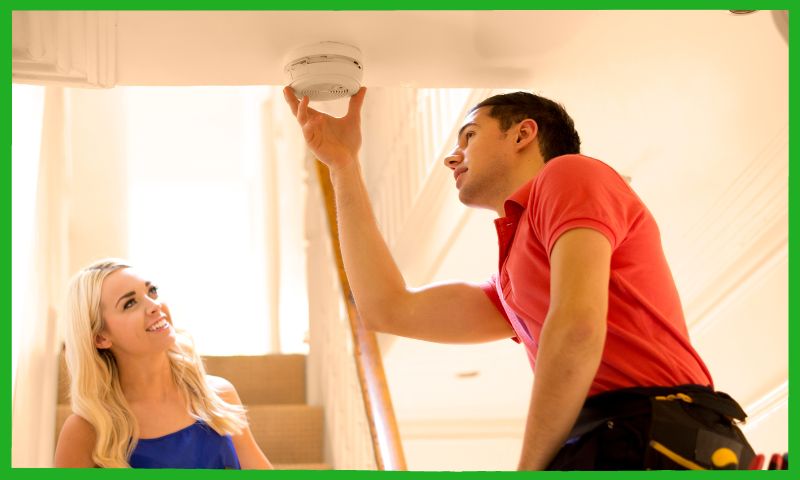
A. Low battery warning
This is the most common cause of beeping, and it’s the smoke detector’s way of saying “Hey, I need a fresh battery!” When you hear this beeping sound, it’s time to replace the battery with a new one to ensure optimal performance. Remember to always use the correct type of battery for your specific model.
B. End-of-life warning
Even the best smoke alarms can’t live forever! Most models have a built-in end-of-life warning that lets you know it’s time to replace the entire unit. Typically, this happens every 10 years. So, when you hear a different beeping pattern compared to the low battery warning, it’s time to get a new smoke detector!
C. False alarms
Sometimes, smoke detectors have a mind of their own and decide to sound an alarm when there’s no fire. These false alarms can be triggered by dust, steamy showers, or environmental conditions like extreme temperature fluctuations. To avoid this, keep your detectors clean and away from areas with high humidity or temperature changes.
D. Interference from other devices
Our homes are filled with gadgets, and sometimes they don’t play nice together. Interference from other devices (like ceiling fans, air vents, or even security systems) can cause your smoke detector to beep. Make sure to install your smoke detector away from any potential sources of interference to minimize this issue.
And there you have it! Now you know the different types of beeping you might encounter with your smoke detector. Keep these in mind, and you’ll be a smoke detector whisperer in no time!
Now that we’ve explored the different types of beeping, let’s dive into the reasons your smoke detector might still beep even after you’ve changed the battery. Trust me, I’ve seen it all, and I’m excited to share my knowledge with you!
Reasons for Beeping After Battery Replacement
Let’s break it down into four main categories:
- Improper battery installation
- Dust or dirt accumulation
- Malfunctioning smoke detector
- Expiration of the smoke detector
1. Improper battery installation
Sometimes, the issue isn’t the smoke detector itself, but how we’ve installed the battery. Here are some common mistakes:
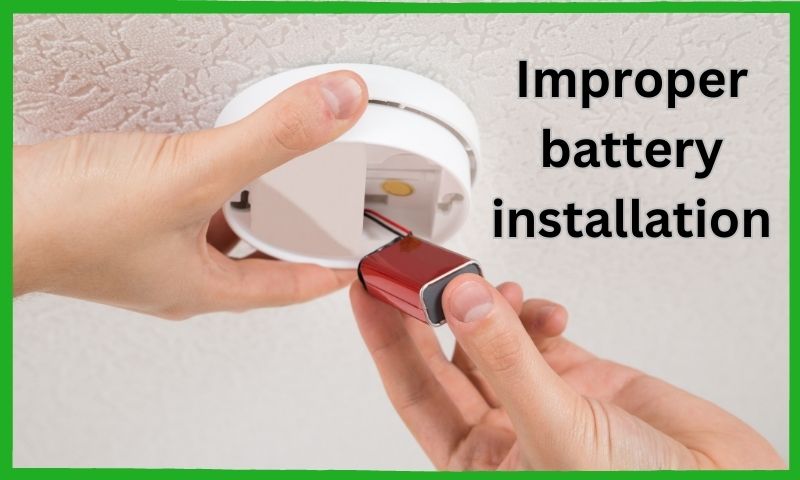
- Incorrect battery type: Always use the recommended battery type for your specific smoke detector model.
- Loose battery connections: Ensure the battery terminals are properly connected for uninterrupted power.
- Battery pull-tab not removed: Don’t forget to remove the pull-tab before closing the battery compartment!
2. Dust or dirt accumulation
Dust and dirt can cause false alarms or even block the sensor, so regular cleaning is crucial. Here’s a step-by-step guide:
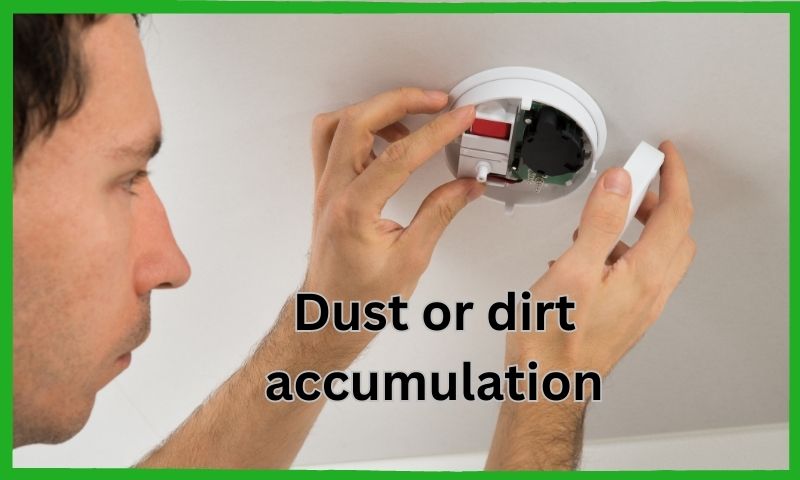
- Turn off the power to your smoke detector (if it’s hardwired).
- Remove the detector from its mounting bracket.
- Use a soft brush attachment on your vacuum cleaner to gently clean the vents and sensing chamber.
- Wipe the exterior with a cloth dampened with mild detergent.
- Reinstall the detector and turn the power back on.
3. Malfunctioning smoke detector
If your detector is still beeping after a battery replacement and cleaning, it might be malfunctioning. Let’s troubleshoot:
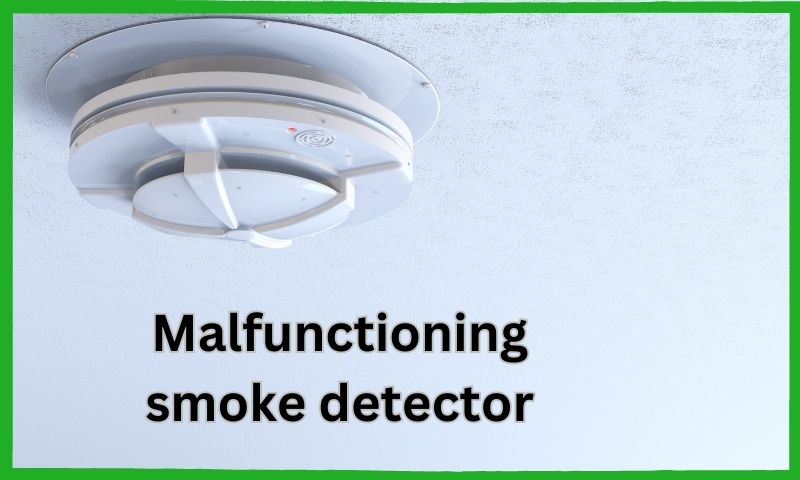
- Press the reset or silence button for 15-20 seconds.
- If the beeping continues, turn off the power and disconnect the backup battery (if applicable).
- Wait a few minutes, then reconnect the battery and turn the power back on.
- If the problem persists, it may be time to replace your smoke detector.
4. Expiration of the smoke detector
Smoke detectors have a limited lifespan, typically 10 years. Here’s how to check the manufacture date:
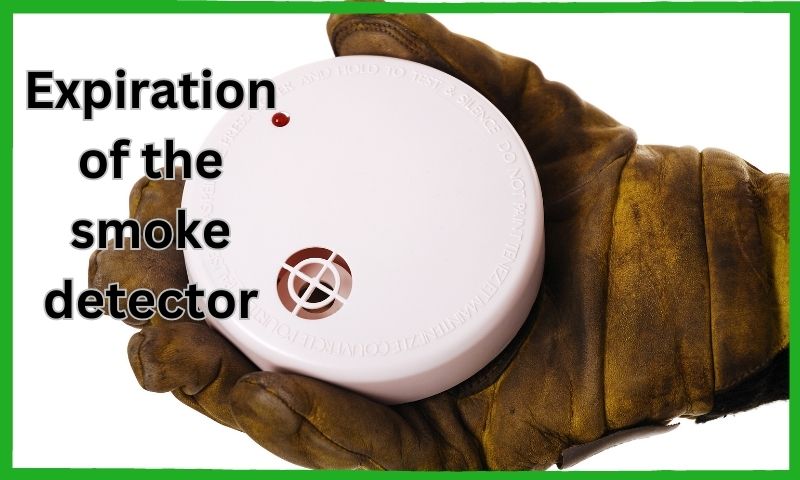
- Remove the detector from its mounting bracket.
- Look for the manufacture date printed on the back or side of the unit.
- If it’s been 10 years or more, replace the entire smoke detector.
And there you have it! By understanding these reasons and following my advice, you’ll be a smoke detector superhero, keeping your home safe and sound!
Now that we’ve covered the reasons for beeping and how to troubleshoot, let’s look at some practical tips to prevent these pesky smoke detector issues in the first place. Trust me, following these tips will make your life a whole lot easier!
Tips to Prevent Smoke Detector Beeping Issues
Here are my top five tips to keep those smoke detectors in tip-top shape:
- A. Schedule regular battery replacement
- B. Clean smoke detectors regularly
- C. Test smoke detectors monthly
- D. Replace smoke detectors every 10 years
- E. Use a combination of ionization and photoelectric smoke detectors
A. Schedule regular battery replacement
To avoid that dreaded low battery beep, make it a habit to replace your smoke detector batteries at least once a year. Pro tip: schedule the replacement during daylight saving time changes, so you’ll never forget!
B. Clean smoke detectors regularly
A clean smoke detector is a happy smoke detector! Regular cleaning can help prevent false alarms and ensure the sensor works properly. Remember to use a soft brush attachment on your vacuum and a mild detergent for wiping.
C. Test smoke detectors monthly
Testing your smoke detectors monthly is a great way to make sure they’re working as they should. Simply press the test button, and you’ll hear a loud alarm if everything’s good. If not, it’s time to change the battery or troubleshoot.
D. Replace smoke detectors every 10 years
Even the best smoke detectors have an expiration date. Make a note of the manufacture date and replace your smoke detectors every 10 years to ensure optimal performance and safety.
E. Use a combination of ionization and photoelectric smoke detectors
Different types of smoke detectors are better at detecting different types of fires. By using a combination of ionization and photoelectric smoke detectors, you’ll have the best protection against various fire scenarios.
And there you have it, folks! By following these tips, you’ll be well on your way to a safe and beep-free home. Happy smoke detecting!
Conclusion
In summary, understanding the reasons behind smoke detector beeping and following the practical tips we’ve discussed can help you maintain a safe and worry-free home. By scheduling regular battery replacements, keeping detectors clean, testing them monthly, replacing outdated detectors, and using a combination of ionization and photoelectric models, you’ll be well-prepared to tackle any smoke detector issues that come your way. With a bit of knowledge and some proactive steps, you can ensure your home stays protected and your smoke detectors stay beep-free. Now go out there and conquer those smoke detectors like the battery expert you are.
We hope this comprehensive guide has given you the confidence and knowledge to tackle any smoke detector beeping issues with ease. But remember, smoke detectors are just one part of maintaining a safe and efficient home when it comes to batteries. For more information on other battery-related issues, check out our articles on why your battery backup is beeping, why your battery charger is flashing red, why your brake and battery light are on, why your car battery light is on after replacing the battery, and why steel wool burns with a 9-volt battery. By staying informed and taking a proactive approach to battery maintenance, you’ll keep your home and vehicles running smoothly and safely. Happy battery managing.
FAQ
How often should I replace the batteries in my smoke detector?
You should replace the batteries in your smoke detector at least once a year. However, it’s a good idea to check the manufacturer’s recommendations for the specific model you have. Some smoke detectors come with a 10-year sealed backup battery, which means you won’t need to replace the battery for the entire lifespan of the detector.
What is the difference between ionization and photoelectric smoke detectors?
Ionization smoke detectors are more sensitive to fast-flaming fires, while photoelectric smoke detectors are better at detecting slow-smoldering fires. Ionization detectors use a small amount of radioactive material to ionize the air, while photoelectric detectors use a light source and a photocell to detect smoke. For optimal protection, it’s recommended to use a combination of both types of detectors in your home.
How do I properly clean my smoke detector?
To clean your smoke detector, first, turn off the power or remove the battery. Use a soft brush attachment on your vacuum cleaner to gently remove dust and debris from the outside vents. If needed, use a mild detergent and a damp cloth to wipe the exterior. Make sure the detector is completely dry before reinstalling the battery or turning the power back on.
Why is my smoke detector beeping even after I’ve replaced the battery?
If your smoke detector is still beeping after replacing the battery, it could be due to improper battery installation, dust or dirt accumulation, a malfunctioning detector, or the detector reaching its expiration date. Make sure to check the battery connections, clean the detector, and inspect the manufacture date to troubleshoot the issue.
How do I test my smoke detector?
To test your smoke detector, press and hold the test button on the unit for at least 15-20 seconds. If the detector is functioning properly, you will hear a loud alarm sound. If you don’t hear the alarm or if it sounds weak, it’s time to replace the battery or troubleshoot any issues with the detector. It’s recommended to test your smoke detectors monthly to ensure they’re in good working condition.

